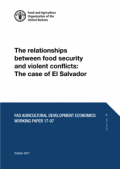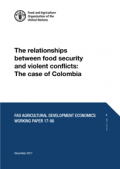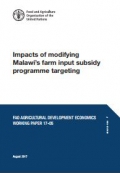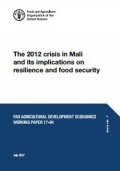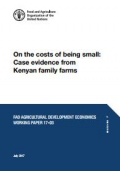Documents de travail de la FAO sur l'économie du développement agricole
About the series (ISSN 2521-1838)
The FAO Agricultural Development Economics Working Paper series, also known as ESA Working Paper series, was created in 2001 and it collects research and policy analysis on agricultural and economic development. The aim of the series is strengthening the capacity of member countries to improve decision-making on food security and nutrition, resilience, climate-smart agriculture, sustainable markets, agribusinesses and rural transformations.
FAO Agricultural Development Economics Working Paper 18-05
Document de travail, 2018
Crop diversification is an important policy objective to promote climate change adaptation, yet the drivers and impacts of crop diversification vary considerably depending on the specific combinations of crops a farmer grows. This paper examines...
Disponible sur:English
FAO Agricultural Development Economics Working Paper 18-04
Document de travail, 2018
During the previous decade there has been an increased focus on the role of food security in conflict processes, both in the academic and policy communities. While the policy community has pushed forward with new...
Disponible sur:English
FAO Agricultural Development Economics Working Paper 18-03
Document de travail, 2018
Significant progress has been made in improving global food security, yet some countries still face severe challenges. In some cases, violent armed conflict has potentially contributed to local food insecurity due to disruption of food...
Disponible sur:English
FAO Agricultural Development Economics Working Paper 18-02
Document de travail, 2018
The prioritization of rice as a strategic food and cash crop in Rwanda has paid dividends, with production increasing by one-third during 2010–2015. However, production expansion has failed to keep pace with growing consumption demand....
Disponible sur:English
FAO Agricultural Development Economics Working Paper 18-01
Document de travail, 2018
Good institutions are a fundamental pre-requisite to successfully achieve structural transformation in growing developing countries (UNECA, 2016). Sub-Saharan Africa is experiencing a rapid growth but a weak and slow structural transformation process, which is mainly...
Disponible sur:English
FAO Agricultural Development Economics Working Paper 17-07
Document de travail, 2017
El Salvador is a peculiar case in that over three decades it has faced two different types of violence consecutively (the civil war and widespread post-war violence), which have had different impacts on food security....
Disponible sur:English
FAO Agricultural Development Economics Working Paper 17-06
Document de travail, 2017
The relationships between food security and violent conflicts are conditioned, mediated and
influenced by the specific context in which they take place. In the case of Colombia, the main
mechanism whereby the armed conflict has had a...
Disponible sur:English
FAO Agricultural Development Economics Working Paper 17-05
Document de travail, 2017
In this paper, we evaluate the impact of this proposed change to the existing FISP design and implementation mechanisms by utilizing two waves of the Living Standards Measurement Study - Integrated Surveys on Agriculture (LSMS-ISA)survey...
Disponible sur:English
FAO Agricultural Development Economics Working Paper 17-04
Document de travail, 2017
Food security can be considered an outcome of resilience. From this perspective, a household can be considered resilient if it manages to recover from a shock and return to the previous level of food security...
Disponible sur:English
FAO Agricultural Development Economics Working Paper 17-03
Document de travail, 2017
We analyse allocative efficiency of major input factors for farmers in Kenya. Marginal value products are estimated for land, labor, inorganic fertilizer and seeds, at the farm household level and compared with marginal costs as...
Disponible sur:English






